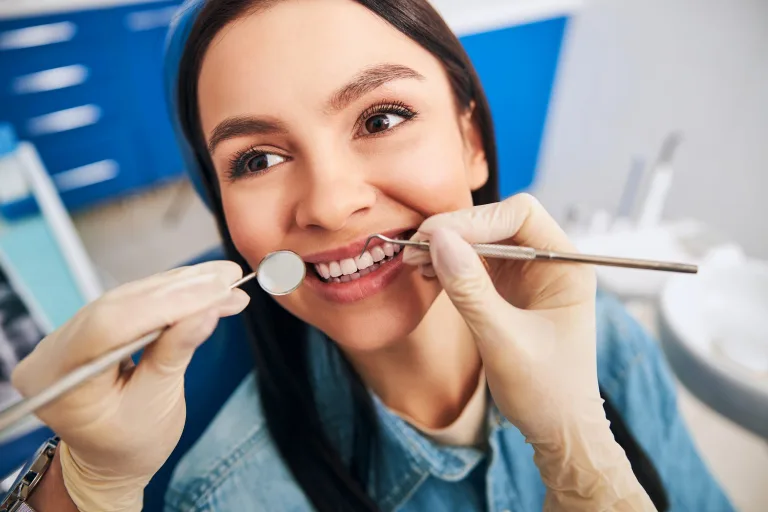How Can I Tell if I Have Cavities?
Cavities aren’t just for kids anymore. Although these tiny holes in our tooth enamel stop being such a major focus in adulthood, that doesn’t mean they aren’t there. There are plenty of signs that cavities may exist in your mouth, so being aware of your general oral health is important.
Of course, watching your diet, brushing and flossing daily, and visiting your dentist regularly are great ways to prevent the cruel pain that can be caused by cavities; but they sometimes sneak up on us anyway. It’s good to understand the warning signs of potential cavities so that you can get treatment as soon as possible.
What is a Cavity?
A cavity is the general destruction of your tooth enamel that creates a hole in your tooth. When plaque builds up on your teeth, which it is constantly doing, it can combine with the sugars and acids in the foods and drinks you consume to attack tooth enamel and wear it down.
For adults, the most common places cavities form are around the edges of teeth or near previous fillings. Proper oral care and getting the right amount of fluoride each day will help to prevent cavities from forming, but it is sometimes hard to reach the areas where they form most commonly in adults.
Knowing the warning signs is essential for you to be able to address your cavities before they become infected or even kill your teeth. If cavities reach your tooth’s nerve, you may end up having to get the tooth extracted.
I Saw the Sign
Sometimes we ignore the symptoms of cavities because we have attributed them to some other cause. For instance, we may think bad breath is due to our love of onions or a sensitive tooth is a part of our genetic makeup, or caused by biting down too hard on a tough food.
Trying not to ignore these signs or toss them aside is important. If you are worried that a new pain, smell, or taste may be linked to a cavity, you can do a self-check at home by searching for small holes with a flashlight and dental mirror. A better option would be to contact your dentist Hicksville, NY for a checkup as soon as possible.
Now that you know what not to do when the signs of a potential cavity arise let’s take a more in-depth look at what these indicators may be and why they could mean you need to head into the dentist.
Bad Breath
If you have bad breath very rarely and it always seems to be right after a big lunch of garlic and onion soup, then it probably is not a sign that you are fighting the good cavity fight. However, consistent bad breath is a potential sign of cavities or tooth decay and should be dealt with as such.
Bad breath indicates potential cavities if it is created by bad bacteria in your mouth, and not by the foods you are eating. If you notice that you are beginning to have a problem with bad breath, your first step should be to step up your game regarding oral hygiene.
At first, you may notice that your breath is increasingly bad in the morning. That is because saliva production decreases during sleep. If brushing your teeth in the morning takes care of the smell for most of the day, there is likely not a cavity present. However, if the smell returns quickly, you may have a larger issue.
Once you have determined that your bad breath is not fixed quickly and easily, it is time to book an appointment with your dentist to see if the problem is cavities or gum disease.
Tooth Pain
A more common symptom of cavities forming on your teeth is pain or sensitivity. Typically pain is related to cavities that have gone untreated for a long period, or where the cavity is deep enough to reach a nerve in your tooth.
Tooth pain can come on spontaneously or when you expose teeth to sugars or acids. Typically if the pain comes on only in the latter scenario, you should see your dentist, as the pain will almost always be caused by a cavity.
Since sweets are usually sticky, they cling to your teeth. The bacteria in your mouth feed on the sugars and turn them into acids, which can leak into your cavities and irritate the nerves. When your nerves are irritated, the pain may be extreme.
If your pain is more spontaneous, you may want to try toothpaste for sensitive teeth first, but seek help if the pain continues. It is also good to note that if you have sensitive teeth already, you are likely to feel pain from cavities caused by eating or drinking sooner than those with less sensitive choppers.
Visible Holes
Cavities often take the form of small holes on the surfaces of your teeth. If you can physically see a hole has formed in or on your tooth, you probably have a cavity. Even if the hole is not a cavity yet, having an opening in the enamel of your tooth gives bacteria a way to enter and cause tooth decay.
Any time you see a hole in your tooth, you should see your dentist. More than likely you will need to have the hole fixed immediately in order to decrease the possibility of your tooth becoming infected.
Gray, Brown, or Black Spots
Similar to the holes that you can see on teeth, if you notice spots pop up on your teeth, you may have a cavity. Typically these spots will be a precursor to holes in your teeth. These spots are a sign that bacteria is making its way through your worn down enamel, so you should see a dentist as soon as you notice these spots.
Pus
When your body responds to an infection, sometimes pus is formed. Pus is made up of dead white blood cells that have been created to fight the infection, as well as bacteria from the infection site. When this pus builds up in an enclosed area, it is called an abscess.
Pus is a severe sign of a cavity and may mean that the cavity has gone untreated for so long and is so deep that the nerve of the tooth is beginning to die. Typically an abscess in the tooth caused by a cavity will be very painful, so you will want to seek treatment quickly to stop that pain and address the underlying issues.
Abscesses in the mouth are exceptionally serious because they can spread an infection to the rest of your body very easily. If you are experiencing pus on or around teeth, especially if an abscess is formed, get to your dentist as soon as possible.
How Cavities are Treated
Treating cavities is simple and vital to your oral health. In order to treat a cavity, you should make an appointment with your dentist so that he or she can assess the situation and come up with the best plan to treat you.
The most effective treatment for cavities is the filling. Fillings not only treat the cavities that you have, but they also prevent the risk of further tooth decay. Because of improvements in technology, fillings last longer and are stronger than ever, so you should not need ever to have them replaced.
The Process
To begin your dentist will deliver a local anesthetic to the affected area of your mouth, which will cause temporary numbness in your teeth, gums, lip(s), and cheek(s). The injection to deliver the anesthetic feels like a small pinch. Some patients even claim not to be able to feel it.
If the thought of a small needle in your mouth causes you anxiety, you can always ask your dentist to provide you with nitrous oxide to help make the process stress-free.
After the numbness takes effect, your dentist will then remove the decayed part of the tooth and clean the area where the filling will go. Once the space is prepared, the filler can be added to the tooth. The filler sets very quickly so that you can get back to your daily routine quickly.
Caring for Fillings
Just like your natural teeth need care daily, so will your fillings. You should brush and floss around fillings just like you would your teeth to keep bacteria at bay. The area around fillings can be an easy target for new cavities to form, so make sure you are dedicated to a fantastic oral hygiene routine to prevent this from occurring.
Wrapping Up
Although preventing cavities is ideal, knowing the signs that a cavity may exist in your mouth is secondarily important to ensure the health of your teeth and gums. If you experience any of the symptoms discussed above, don’t hesitate to call your dentist and set up an appointment or ask questions.
Your oral health is vital to the health of the rest of your body, and treatment shouldn’t be delayed. Keep an eye out for warning signs of cavities forming so that you can prevent illness and infection from occurring.



